Democrats Push for Strengthening Social Security in First Hearing of New Congress
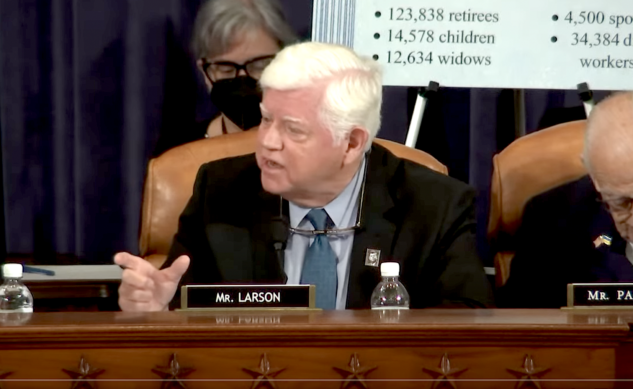
The first hearing of the new Congress on Social Security saw Republicans claiming that they simply want information about the program’s status, while Democrats insisted that it’s time to boost Social Security — and pushed back on GOP proposals to cut benefits.
“Today, we are faced with the fierce urgency of now. Five million Americans receive below-poverty level (Social Security) checks from their government because Congress has not enhanced benefits in more than 50 years,” said Rep. John Larson (D-CT), ranking member and former chairman of the House Ways and Means Social Security Subcommittee. “We need to protect and enhance this vital program, not cut it!”
In written testimony, NCPSSM President and CEO Max Richtman reminded subcommittee members that “Social Security is more than just a safety net program. It is an earned benefit that provides families with insurance to help cover the loss of income if their primary breadwinner dies, becomes disabled or retires.”
The subcommittee, chaired by Rep. Drew Ferguson (R-GA), heard from three expert witnesses: Stephen Goss (Chief Actuary at the Social Security Administration); Barry Huston (Analyst at the Congressional Research Service); and Dr. Phillip Swagel (Director of the Congressional Budget Office). Republicans pressed each witness for demographic and financial data about Social Security in the wake of the latest Trustees report projecting that the program’s combined trust fund will become depleted in 2034, absent Congressional action.
In his testimony, Chief Actuary Goss pointed out that the depletion date hasn’t really fluctuated much in the past decade or so. “The projected date has been 2033 to 2035 for the past twelve years,” he said. “We’re simply getting closer to the date.”
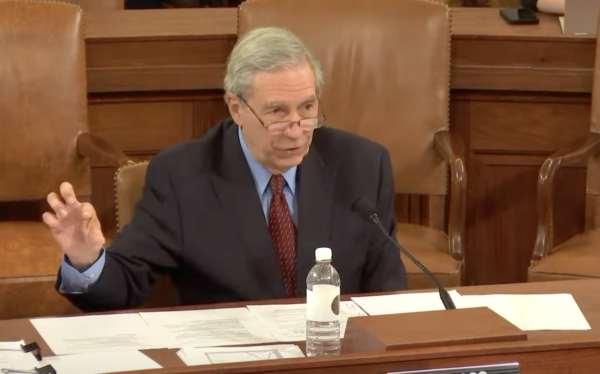


Chief Actuary Stephen Goss says trust fund insolvency date hasn’t really changed much in 12 years
Congressional Republicans have seized on the trust fund’s insolvency date to advocate “reforms” to Social Security that ultimately would cut benefits – including raising the retirement age to 70, means testing, and adopting a more miserly COLA formula.
“The House Republican Study Committee proposed to raise the retirement age to 70 years old, reduce benefits for anyone earning over $60,000 a year, and privatize Social Security,” said Rep. Linda Sanchez (D-CA). She accused Republicans of “trying to cut hard-earned benefits for working class families” and labeled GOP proposals for Social Security “reheated leftovers that keep making their way to the table.”
Subcommittee member Rep. Bill Pascrell (D-NJ) criticized Republican Senator Ron Johnson (R-WI) for calling Social Security a “Ponzi scheme.” The congressman offered a passionate defense of Social Security, saying that the program “has kept the American dream within sight for generations of families. And we know there are a lot of families who subsist on Social Security alone.”
Chairman Ferguson offered Rep. Pascrell the assurance that “the Senator from Wisconsin (Ron Johnson) will not be taking a vote on this subcommittee.” He promised that Republicans seek a “bipartisan approach,” adding, “I would like to put your minds at ease: you won’t have to worry about voting on the Republican Study Committee plan on this subcommittee.”
Democrats, including Rep. Larson in the House and Bernie Sanders in the Senate, have offered legislation to strengthen Social Security’s finances and expand benefits – by asking the wealthy to contribute their fair share. Both Larson’s and Sanders’ bills would adjust the payroll wage cap to raise more revenue from high income earners. Under current law, wages above $160,200 are not subject to Social Security taxes.
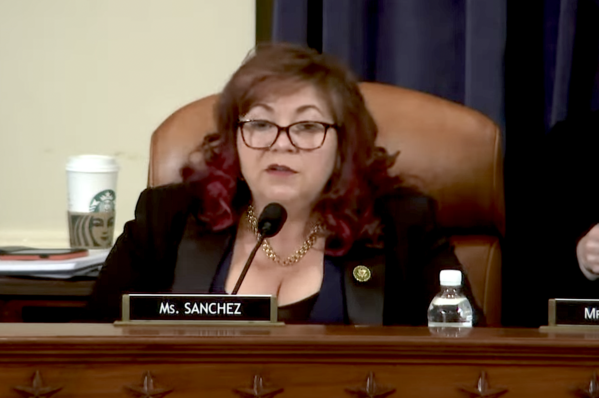


Rep. Linda Sanchez: GOP proposals are “reheated leftovers that keep making their way to the table.”
Chief Actuary Goss’ testimony seemed to bolster the case for raising the payroll wage cap. He said that the percentage of wages captured by the payroll tax dropped from 90% in the early 80s to roughly 82% by the year 2000, “knocking down revenue we would have been getting.” Goss attributed this gap to rising income inequality, with those near or above the “payroll tax maximum” earning increasingly higher wages during the past four decades than those below.
With nearly half of retirees depending on Social Security for all of their income, and many teetering on the brink of poverty even with their monthly benefit checks, the stakes could not be higher. “Social Security is a promise,” said Rep. Pascrell. “So, whatever changes we’re going to make, we better get it right.”
**** Watch the full Social Security Subcommittee hearing here ****
Why GOP Medicaid Work Requirements Are Such an Awful Idea
The House Republicans’ debt ceiling bill includes drastic cuts to federal programs that seniors and other vulnerable Americans rely on. But it also imposes work requirements on lower income people who receive health coverage through Medicaid. Under the GOP plan, Medicaid patients would have to work at least 80 hours per month or lose their coverage. We spoke to the National Committee’s senior health policy expert, Anne Montgomery, about why this is such a bad idea.



A: It’s harmful because regardless of whether or not you’re working, everyone needs ongoing access to health care. Medicaid is a health insurance program for lower-income Americans, not a work program. It makes no sense to deny medical coverage to people by requiring them to prove to state bureaucrats that they are working. If you need care, you should be able to get it. To condition one upon the other makes no sense.
Q: Why shouldn’t Medicaid beneficiaries have to work in order to keep their benefits?
A: There are many people who may not be able to work due to chronic health conditions or disabilities. Or they may be taking care of loved ones who are sick. There are others who, because of the ‘gig economy,’ may be in and out of work and have trouble finding steady employment. Turnover is particularly high (and work hours inconsistent) in the service and retail sectors. Under the Republican proposal, if you don’t have consistent work, you may lose your health coverage.
Q: Couldn’t some of these workers simply apply for disability insurance?
A: It’s not as simple as snapping your fingers, and you’re on disability. First of all, only 40% of people who apply for Social Security Disability Insurance (SSDI) actually are approved for benefits. Secondly, why would you want people to go onto disability insurance if the aim is to encourage work?
Q: With these work requirements comes a lot of new ‘red tape.’ How might this be an obstacle to people trying to keep their Medicaid coverage?
A: Yes. Not only would you have to be working – or find work – in order to keep your health coverage, you would have to meet strict documentation requirements, which involves additional red tape and paperwork. In pilot programs for Medicaid work requirements, people have lost coverage because of confusion rather than not working. Medicaid beneficiaries should work when they can, but we shouldn’t yank their health care from under them if they can’t work at a particular time.
Q: Would Medicaid work requirements seriously increase the number of Americans working?
There is no evidence that Medicaid work requirements actually would boost employment. In states which have experimented with work requirements, that certainly isn’t the case. In Arkansas, for instance, 17,000 patients lost Medicaid coverage for failing to meet the requirements. An analysis found that “Medicaid beneficiaries had not started working more or earning more money as a result of the policy.”
Q: What is the real agenda behind Medicaid work requirements?
Conservatives have long opposed Medicaid as “just another welfare program” and a “waste of taxpayer dollars,” while in reality it is a crucial part of our health care system that pays for coverage for tens of millions of lower-income Americans — and the hospitals, doctors and nursing homes who care for them. In fact, according to the Centers for Medicare and Medicaid (CMS), more than 92 million Americans were enrolled in Medicaid and CHIP (in the 50 states and the District of Columbia that reported enrollment data for December 2022). The GOP was especially upset by Medicaid expansion under the Affordable Care Act (though many red states now have expanded their Medicaid programs under the ACA). Imposing work requirements is a way to drastically reduce the number of Americans on Medicaid rolls, with no regard for the impact on patients’ health.
Q: The Republicans’ work requirement proposals come at a particularly fraught time, as federal COVID emergency measures come to an end, right?
A: That’s right. Under the Public Health Emergency (PHE) state Medicaid programs were required to keep people continuously enrolled in exchange for additional federal funding. With the PHE phaseout that begin this month, millions of Americans will now have to go through a “redetermination” of their eligibility for Medicaid coverage for the first time in 3 years. Imposing work requirements at the same time that many are already losing access to Medicaid coverage is punitive and unnecessary. Republicans are effectively using this process as an opening to slash federal spending on a constituency that they believe doesn’t have a lot of political power.
Ohio Forum Focuses on Cutting Vs. Expanding Social Security



National Committee president and CEO Max Richtman brought the organization’s message of expanding and strengthening Social Security to Ohio today. He participated in a forum in Sandusky, OH, co-sponsored by the local nonprofit, Serving Our Seniors. The forum, entitled, The Future of Social Security Retirement Income, was attended by more than two hundred citizens, mostly seniors who are already collecting benefits. [WATCH THE FORUM HERE.]
Richtman appeared alongside Rep. Marcy Kaptur (D-OH), a champion for seniors who represents the Sandusky area in the U.S. Congress. (Rep. Kaptur earned 100% on the National Committee’s most recent legislative scorecard.) The forum was moderated by Sue Daugherty, executive director of Serving Our Seniors, and also included a representative of the conservative/libertarian Cato institute, Romina Boccia. According to the site, Influence Watch, the Cato Institute “has received funding from a number of right-of-center organizations, including the Charles G. Koch Charitable Foundation.”
“This forum isn’t about politics of it. It’s all about informing all of us of the realities of it. How will we, as a nation, sustain these important programs? That’s the big question and our panel crosses across the spectrum of politics.” – Sue Daugherty, moderator and CEO, Serving Our Seniors
The forum featured lively exchanges between audience members and panelists, with Richtman advocating for revenue-side solutions to Social Security’s financial challenges. (The combined trust fund is projected to become depleted in 2034, absent Congressional action.)
Boccia urged the kind of reform championed by conservatives, including reducing benefits for future generations of retirees, at least partially privatizing the program, and the creation of a special commission to propose Social Security reforms (presumably along the lines of the Simpson-Bowles commission in the 2010s). That commission’s recommendations, including some benefit cuts, were never adopted.
Richtman made clear NCPSSM’s opposition to the kinds of solutions offered by Boccia, especially benefit cuts for future retirees, who will rely on Social Security even more than today’s seniors do.
“Our message is that Congress needs to act. If there’s no action, that’s not acceptable because there would be automatic cuts in 2034. What we favor is bringing more revenue by having the wealthy begin paying their fair share. And in exchange for contributing more, higher earners should realize higher benefits than they do now. It’s important to maintain that fundamental principle of Social Security.” – Max Richtman, NCPSSM President & CEO
Richtman endorsed legislation from Senator Bernie Sanders and Rep. John Larson (who soon will be re-introducing his Social Security 2100 Act), both of which would bring more revenue into Social Security by adjusting the payroll wage cap – and in Sanders’ case – using investment taxes to help shore up the program. Both Sanders’ and Larson’s bills also would boost benefits across-the-board, in addition to targeted increases for the most financially vulnerable seniors.
According to Richtman, most of the audience at the forum seemed to support the push to expand and strengthen Social Security, rather than cutting benefits or privatizing the program. Polling bears this out. A recent Data for Progress poll indicates that a majority of voters across party lines oppose raising the retirement age for today’s younger adults – a prominent GOP proposal of late. Other polling shows significant bipartisan support for expanding benefits by having the wealthy contribute more. (Earnings over $160,200 are not currently subject to Social Security payroll taxes.)
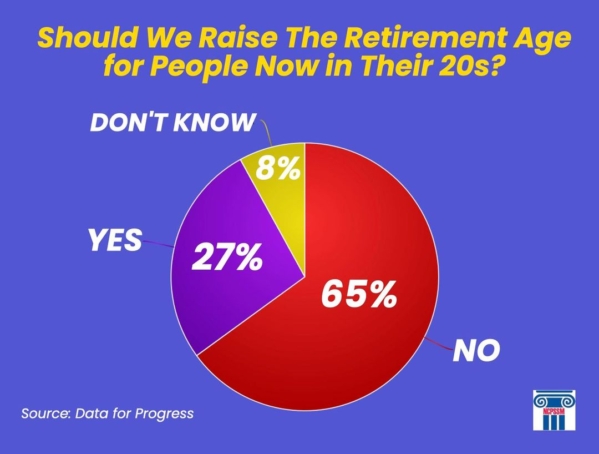


Republicans have generally rejected revenue-based solutions, insisting that “entitlements” need to be “reformed” or “looked at” (in other words, cut) in order to reduce federal debt, even though Social Security is self-funded and does not contribute a penny of red ink. The Sandusky Register newspaper reported that, despite the Cato Institute’s presence at the forum, other conservatives did not accept invitations to participate, including freshman Senator J.D. Vance (R-OH) and the DC-based Heritage Foundation.
NCPSSM-Endorsed Candidate Wins Wisconsin Supreme Court Race
The National Committee-endorsed candidate in the pivotal Wisconsin State Supreme Court race prevailed in yesterday’s elections. Judge Janet Protasiewicz bested her opponent, Daniel Kelly, by 10 points on Tuesday, changing the complexion of the court. Liberals will now be in the majority for the first time in some fifteen years.
NCPSSM’s political action committee (PAC) does not usually weigh into state political races, but made an exception with Protasiewicz because of the stakes for seniors – both directly and indirectly – in this election. Protasiewicz’s opponent, Judge Daniel Kelly, had characterized Social Security as “involuntary servitude” by taxpayers to benefit those whom he described as “people who have chosen to retire without sufficient assets to support themselves.”
“Unlike Judge Kelly, we are confident that Janet Protasiewicz values the dignity and independence of retirees in Wisconsin who have worked hard, paid their taxes and played by the rules,” said Max Richtman, President & CEO, National Committee to Preserve Social Security and Medicare
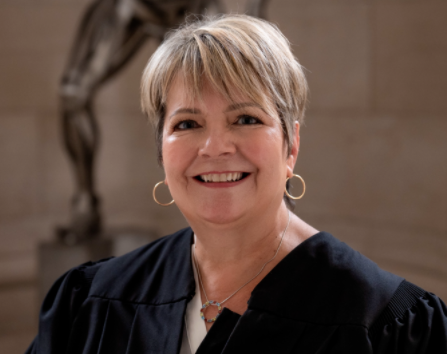


“Voter rights — including the rights of older Wisconsinites to vote for pro-senior candidates — won yesterday in Wisconsin,” said NCPSSM PAC director, Dan Adcock. “As a justice on the Wisconsin Supreme Court, Janet Protasiewicz will protect democracy by ensuring free and fair elections are held in the Badger state. Congratulations to her for an impressive victory!” – Dan Adcock, NCPSSM PAC Director
The Wisconsin Supreme Court election was dubbed the most high-stakes race of 2023. Protasiewicz’s victory will help determine the future of gerrymandered legislative maps drawn by Republicans – and voting rights issues in a pivotal state heading into the 2024 presidential elections. These electoral issues have the potential to affect policy on the national level, including the future of Social Security, Medicare, and Medicaid – all three of which are under attack by Republicans.
“Free and fair elections are the only way older Wisconsinites have a fighting chance to elect candidates that value the earned economic and health security they receive through Social Security and Medicare. Without the check on the state legislature and governor that Judge Protasiewicz will provide as a Supreme Court Justice, the deck would have been stacked against older voters.” – Max Richtman
Protasiewicz, who pulled off an impressive state-wide win, told a “jubilant” crowd in Milwaukee last night, “Our state is taking a step forward to a better and brighter future where our rights and freedoms will be protected.” In true MAGA fashion, her opponent refused to concede graciously after Protasiewicz became the projected winner, characterizing her “an unworthy opponent.” As the New York Times reported, Daniel Kelly called his rival’s campaign “truly beneath contempt.”
“Today’s results mean two very important and special things,” Judge Protasiewicz said. “First, it means that Wisconsin voters have made their voices heard. They have chosen to reject partisan extremism in this state. And second, it means our democracy will always prevail.”
Social Security is Not Going Bankrupt, But Needs to be Strengthened



In their report released on Friday, the Social Security Trustees projected that the program’s combined trust fund will remain solvent until 2034 – one year earlier than previously projected. At that time, the program still would be able to pay 80% of benefits. As of the end of 2022, the trust fund had $2.83 trillion in reserves.
“Contrary to conservative claims, Social Security is not ‘going bankrupt’; the program will always be able to pay benefits because of ongoing contributions from workers and employers. In fact, this is yet another Trustees report showing that Social Security remains strong in the face of turmoil in the rest of the economy. Its projected insolvency date has stayed roughly the same even after a global pandemic and recent economic upheavals.” – Max Richtman, NCPSSM President and CEO
Congress can strengthen the program’s finances by bringing more revenue into Social Security. We support legislation introduced by Senator Bernie Sanders to keep the trust fund solvent for the rest of this century while expanding benefits. We also support Rep. John Larson’s Social Security 2100 Act, which the congressman plans to re-introduce this Spring. Both bills would adjust the Social Security payroll wage cap so that higher-income earners begin contributing their fair share.
Republican proposals to “reform” Social Security are the wrong kind of action. The TRUST Act would put the future of Social Security in the hands of a special committee that could provide members of Congress with political cover for cutting benefits. The 2022 House Republican Study Committee budget blueprint calls for raising the retirement age to nearly 70, a huge lifetime benefit cut. Ditto for the Cassidy-King proposal taking shape in the Senate, which also would gamble future retirees’ benefits on Wall Street – a truly dangerous idea.
Many Republicans insist that they won’t cut benefits for today’s retirees — only for future beneficiaries. But Gen Z and Millennials will need their Social Security benefits even more than current retirees do, thanks to chronically flat wages, disappearing pensions, and mounting student debt, among other factors.
“President Biden and congressional Democrats see Social Security as a house that needs renovations and an addition built. Republicans want to knock down the entire house or, at the very least, weaken the foundation — if not today, then in decades to come. Today’s Trustees report is not an excuse to cut Social Security; it’s a reminder that the program needs to be strengthened and expanded without asking seniors, people with disabilities and survivors to bear the cost.” – Max Richtman


